ADVICE FOR THE YOUNGIN Or 7 (or more) Steps to Success and Longevity in the World of Black Speculative Fiction
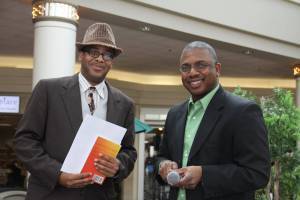 A common criticism that many veteran authors – and by ‘veteran author’, I mean one who has published more than one book, play or screenplay and who has been in the industry for at least 5 years – have about young authors entering the industry is that these youngins – and by ‘youngin’, I mean any person whether young or old, who an elder, in whatever field, is duty bound to guide and teach – want all the trappings of a successful career but aren’t willing to put in the work needed to earn them.
A common criticism that many veteran authors – and by ‘veteran author’, I mean one who has published more than one book, play or screenplay and who has been in the industry for at least 5 years – have about young authors entering the industry is that these youngins – and by ‘youngin’, I mean any person whether young or old, who an elder, in whatever field, is duty bound to guide and teach – want all the trappings of a successful career but aren’t willing to put in the work needed to earn them.
This isn’t surprising. Unlike when I grew up and recognition and reward was earned through hard work – many of our young people grew up getting trophies and accolades just for trying. Consequently, the idea that you might actually have to earn success through hard work has died.
While trying is worthy of applause, trying your best is worthy of reward.
Paying your dues is not an antiquated idea. Nor is respect for those who do so.
Paying your dues, of course, doesn’t mean slogging through 80 hours a week at a job you hate, or jumping through hoops for no reason other than your higher-ups had to, so now you do. Paying your dues means putting in the time and work to attain what you envision.
 I know several brothers my age who are unemployed and, at damned near fifty, are still living with their parents because they can’t get the job they feel they deserve, and they refuse to work a “menial” job because they think it’s beneath them. This arrogance and ignorance has provided fuel for their laziness and their fear of experiencing the discomfort that comes with growth.
I know several brothers my age who are unemployed and, at damned near fifty, are still living with their parents because they can’t get the job they feel they deserve, and they refuse to work a “menial” job because they think it’s beneath them. This arrogance and ignorance has provided fuel for their laziness and their fear of experiencing the discomfort that comes with growth.
Success comes from years of hard, persistent work. Respect for your work and for your opinion comes when people recognize that you have put in the work necessary to be considered proficient in your field.
Even overnight successes aren’t really overnight. Bruce Lee seemed to burst onto the scene back in the early 1970s, but Bruce had been acting since the 1940s.
While it seems Facebook is your typical overnight success, it was actually years in the making. Mark Zuckerberg started computer programming in middle school. While most teenagers were playing video games and watching TV, Zuckerberg was hammering out code. Consequently, when the muses visited Zuckerberg in his dorm room, he was ready with the knowledge and skills to build Facebook. Even after Facebook launched, it would take a few years for the site to grow to where it is today.
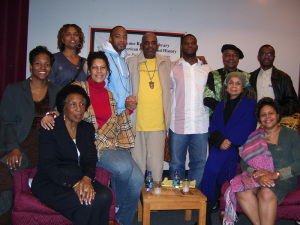 Last week, my student and comrade, Ajigunwa Mayami, stayed over at my house to complete some spiritual work. Throughout his time with my family and me, we discussed much (he’s a deep brother). At one point, we discussed Black Speculative Fiction – Ajigunwa, a fan of Black Speculative Fiction, has read all of my and Milton Davis’ books. Ajigunwa asked me to name all of the great Black authors of Speculative Fiction who I have been fortunate to learn personally from and / or work with. My list included Charles Saunders, Derrick Ferguson, Tananarive Due, Steven Barnes, Geoffrey Thorne, Abiodun Oyewole, of the Last Poets, Valjeanne Jeffers, Eugene Redmon, Hollywood filmmaker and screenwriter, R.L. Scott, Dr. DeWitt Kilgore and, of course, Milton Davis. This list does not include the amazing authors, artists and filmmakers I have shared panels and conducted workshops with, just those with whom I have personally had conversations with, done interviews with, who have written introductions in my books, who have taught me, who have given me sound advice and those few who are my Jegna (“mentors”).
Last week, my student and comrade, Ajigunwa Mayami, stayed over at my house to complete some spiritual work. Throughout his time with my family and me, we discussed much (he’s a deep brother). At one point, we discussed Black Speculative Fiction – Ajigunwa, a fan of Black Speculative Fiction, has read all of my and Milton Davis’ books. Ajigunwa asked me to name all of the great Black authors of Speculative Fiction who I have been fortunate to learn personally from and / or work with. My list included Charles Saunders, Derrick Ferguson, Tananarive Due, Steven Barnes, Geoffrey Thorne, Abiodun Oyewole, of the Last Poets, Valjeanne Jeffers, Eugene Redmon, Hollywood filmmaker and screenwriter, R.L. Scott, Dr. DeWitt Kilgore and, of course, Milton Davis. This list does not include the amazing authors, artists and filmmakers I have shared panels and conducted workshops with, just those with whom I have personally had conversations with, done interviews with, who have written introductions in my books, who have taught me, who have given me sound advice and those few who are my Jegna (“mentors”).
Looking at the list humbled me. I have had the opportunity to work with, learn from and be associated with some of the best in the business.
I have had this opportunity because I NEVER presented myself as a peer to these giants in speculative fiction, but as a student, eager to learn; as a fan; as a writer determined to be published and willing to work hard as hell to do so. If any of the aforementioned authors have become friends, or have come to consider me a peer in the book or film industry, it is because I work persistently and without fear while maintaining the utmost respect for myself, for my elders – in and outside of the field – and all who run the marathon on the road to success.
Just as it applies to me, part of what will make you successful is your respect for those who came before you.
The Internet, however, has affected this old-school approach of respecting your elders.
Recently, a young writer, in disagreement with my opinions about Hollywood not being a place that Black people will ever have control of their imagery and the proper portrayal of Black heroes and Black loving relationships, decided to correct me and tell me about my lack of experience in Hollywood filmmaking, thus my lack of knowledge on the subject. Damn the fact that I have worked in “Hollywood” (here, we mean Hollywood, the mainstream, not the location in Cali) as a screenwriter and filmmaker for decades.
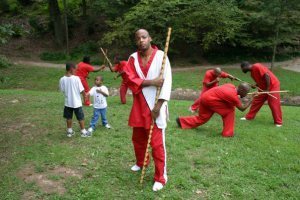 In another instance, a young artist, with no martial arts experience, verbally attacked me and called me a “coon” because I disagreed with her statement that the martial art Ninjutsu and Ninjas come from Afrika. Damn the fact I wrote a book on the history and techniques of indigenous Afrikan martial arts. Damn my 42 years of training in, and study of, the Afrikan martial arts.
In another instance, a young artist, with no martial arts experience, verbally attacked me and called me a “coon” because I disagreed with her statement that the martial art Ninjutsu and Ninjas come from Afrika. Damn the fact I wrote a book on the history and techniques of indigenous Afrikan martial arts. Damn my 42 years of training in, and study of, the Afrikan martial arts.
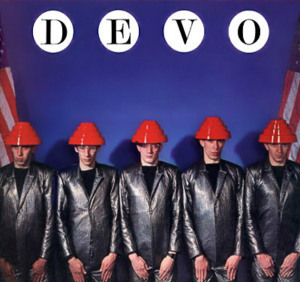 Now, I am not some diva (devo?) who thinks his poop smells like watermelon on a bed of roses, but come on, have some goddamned respect for your elders, youngin.
Now, I am not some diva (devo?) who thinks his poop smells like watermelon on a bed of roses, but come on, have some goddamned respect for your elders, youngin.
The Internet has allowed writers with little or no experience to become experts on everything from the craft of writing, to publishing, to copyright law.
In this same digital world called the Internet, what you say and do exists forever on the information superhighway. Therefore, youngin, I suggest that before you start spouting the wisdom you garnered from your 10 minutes in the business, do a little research before what you say and do one day comes back to bite you in the ass.
And the most basic rule: don’t assume you know everything or anything about writing. You will be surprised how your style and tastes grow and your understanding of writing expands as you open your mind to those who have come before you.
In the Yoruba spiritual tradition of Ifa, in which I am initiated as an Awo (priest of Ifa, aka Babalawo) and as an Olorisa ( priest of Obatala) among other things, we have sixteen laws that govern how elders – and indeed all of us, especially youngins – should conduct ourselves.
The first law is stated thusly:
They (16 elders) walked to Ile Ife in order to request long life. Will we live as long as Olodumare (God) was their question to Ifa. They (the Babalawos) warned, do not call esuru (ay-soo-roo; a type of yam) esuru (ay-SOO-roo; the sacred stories) (Which means do not say what you do not know).
Ifa is based on the principle of humility. In Western culture, it is considered a sign of weakness to admit a mistake or to acknowledge a lack of understanding. In traditional Afrikan culture no one is expected to know everything – “the master blacksmith in one town is the student blacksmith in another” – which is why we build community.
If you do not know the answer to a question someone else will. Ifá says good character requires the ability to admit you do not know the answer to a specific question and to make some effort to find an expert on the subject in the community and get the answer from them.
The Yoruba believe that those who pretend to be experts block their chance to connect with Spirit.
The fifth law says:
They warned them not to try to swim when they do not know how to swim. (Which means do not pretend to be wise when you are not).
Those of us who claim to know everything – called False Omniscience – are making a critical and possibly fatal mistake. False Omniscience is an epidemic within the geek community and within the martial arts and I know several so-called masters who suffer from it. Ultimately, it leads to embarrassment because the day will certainly come when the person is asked a question they cannot answer and their veneer of all-knowingness will shatter.
Any attempt at being an all knowing elder in light of the unknowable mystery of Creation is considered arrogance at best and foolishness at worst. Any attempt by a youngin to do this is foolish – and almost laughable – at best and just plain ig’nant at worst.
And the sixth and final law I will share states:
They warned them to be humble and never be egocentric.
This establishes the difference between those elders who believe the community should serve them and those elders who understand that they serve the community.
We must be humble. True humility is demonstrated in a willingness to listen to someone else’s opinion and to consider it long enough to test its validity in the real world.
A person who is always right and who never makes mistakes has a straight line learning curve that in turn creates a distortion in their perception of self and world. No one is right about everything all the time. Even a broken clock is right twice a day.
The belief that you are always right is a delusion and delusion is the source of mental illness.
If this applies to elders, it applies even more to you youngins who are old enough to know better, but not old enough to know better than your elders.
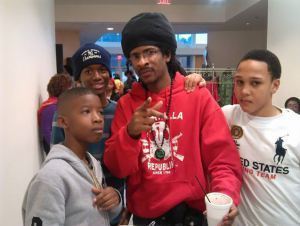 Our young people, with their energy and boldness, insure that we live on; that our art and culture is not lost. The universe blesses the bold. However, our young people will continue to start at square one without the guidance of those who have done and gone what and where our young people want to do and go. Many are too green and too ignorant to recognize their need for elders, or even to recognize who their elders are. This is not an insult, it is truth and, as elders, we must speak the truth, regardless of who or what. We must guide our young people aright.
Our young people, with their energy and boldness, insure that we live on; that our art and culture is not lost. The universe blesses the bold. However, our young people will continue to start at square one without the guidance of those who have done and gone what and where our young people want to do and go. Many are too green and too ignorant to recognize their need for elders, or even to recognize who their elders are. This is not an insult, it is truth and, as elders, we must speak the truth, regardless of who or what. We must guide our young people aright.
Each one, teach one.





